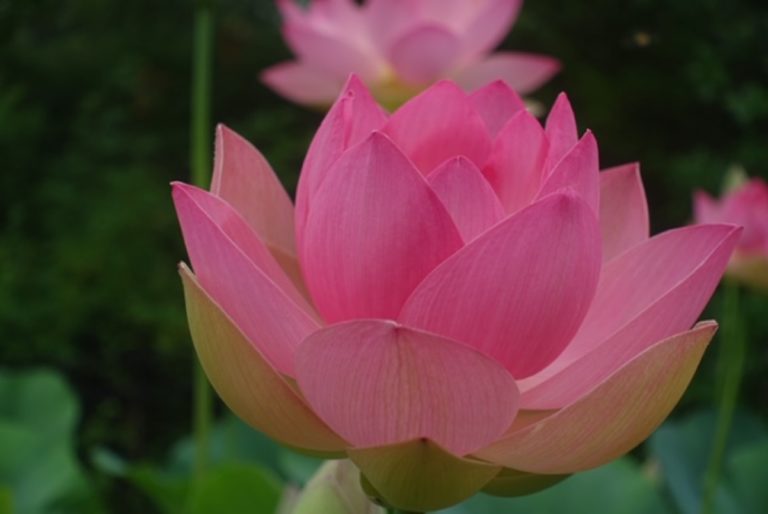
Similar Posts

729th Week: Foreground/Background Revisited
It goes without saying that these are stressful times and we all are having to dig into the strategies that we have for finding and accessing our internal steadiness and sense of centeredness. One of the practices I’ve written about many times over the years has to do with recognizing, and then playing with, the constant process of choosing what is in the foreground of awareness and what is in the background. Our culture tends to favor putting activation, emotional intensity, and drama into the foreground, while experiences of being centered, steady, and internally quiet slide into the background, often not to even be acknowledged as present.
Another dynamic I’ve written about many times is the metaphor of the kaleidoscope—that we are all complex beings comprised of many aspects or parts of ourselves. Sometimes we’re fully focused in our present-day adult self, thinking, responding, and behaving in centered and rational ways. Other times, we are triggered into different kinds of activation and find ourselves acting from impulses that arise deep within unhealed and uncentered parts of us. Read More “729th Week: Foreground/Background Revisited”

778th Week: Foreground/Background Dynamics Revisited
A while back (764th Week’s practice), I wrote about choosing frequencies and engaging practices that make that process more fluid. Another helpful approach is to cultivate an awareness of the “foreground/background” dynamic that is present in every moment. Whatever is in the foreground of your awareness, there is likely to be something different in the background.
One way to think about these foreground/background dynamics could be the distinction between moments of upset in the foreground and an awareness of the present-day observer in the background. The observer is the part of us that notices what we experience and is able to make choices about what to do with what we notice. In this case, we’re exploring finding ways to shift from the foreground upset to a background of a more regulated quality, if that’s what you choose to do.
Drawing on an awareness of foreground/background allows more choice about whether you want to continue with the focus of your attention and experience or if you want to shift frequencies to something else that you may find in the background. For example, you may be upset over a news report you just heard, with your body tense, fear in the foreground, and thoughts of what terrible things might unfold. These responses are natural in these times, but you don’t need to live there. Once you notice how distressed you are, it’s possible to become curious about what might be in the background. Perhaps you notice a quality of quiet, or ease, internal steadiness, or reassurance of some kind. This doesn’t mean you are ignoring or denying issues that are realistically upsetting. Instead, it means that you will be able to respond more coherently if you aren’t caught up in the activation related to them.
Read More “778th Week: Foreground/Background Dynamics Revisited”
836th Week: Noticing Where We Put Our Energy
I just saw a little dog standing in an open area of lawn, wildly barking at a squirrel who was up a very tall tree nearby. It made quite a funny picture, with the lawn and the size of the tree making the small dog look even smaller. What it brought to mind was a sense of focused intention and energetic commitment. The squirrel was all that mattered and the little fur-face on the ground was giving it all he was worth.
This got me to thinking about where we put our energy. All the barking in the world wasn’t going to get the squirrel within reach of the dog and I found myself wondering about all the energy we may put into things that aren’t really available to engage with us. With all the gadgets that we now have available to us, and with most of us carrying around a computer in our pocket in our smart phones, there are increasing opportunities to spend time in less conscious and less focused ways. At times, I find myself doing a word game that can take up an unexpected amount of time and I’ve made a commitment to myself that I’ll only do that a couple of times a day. Instead of that activity, I now spend the same time reading on my kindle and I find that it’s much more satisfying, ultimately, than endlessly playing the word game.
Also, at my age, I’m keenly aware of a more limited amount of time in front of me and I have made it a practice to ask myself if what I’m doing honors the fact that I don’t want to waste whatever time I have left to be here. I hope that doesn’t sound morbid because, for me, it’s a powerfully positive motivator and invites me to focus my attention more clearly.
Read More “836th Week: Noticing Where We Put Our Energy”
912th Week: Responding to Challenges
I haven’t posted a practice in conscious living for a few weeks now, as life has intervened with some challenges that have required my deep attention. As I’ve thought about this recent time, I want to share a practice I have engaged that may be useful to describe.
One of the sweet feline family members who live with me has required medical attention and I found myself faced with having to give him a subcutaneous infusion for hydration every day, to support what his kidneys can’t currently do efficiently right now. My relationship with needles has mostly been around experiences of blood draws, shots, and acupuncture, but I haven’t been the one managing the needles. So, I found myself dealing with some anxiety about having to use a needle each day to deliver the hydration to my dear feline.
Moving through this experience reminded me of the importance of grounded, steady presence and of being mindfully connected to this present moment. I decided to take on the daily process as a spiritual practice, bringing awareness, calm, and love to something that would allow my furry family member to survive. Along with focusing in my heart and connecting with my love of this sweet being, I have asked myself to track my internal state so that I am calm and centered during the infusions. Even as I give the infusions, I track my body and go back into calm if I find myself tensing or becoming anxious. Gently breathing in through my nose and out through my mouth helps to return to a more settled state and I sense how that state in me helps my furry friend to relax a bit more.
And so, for this week’s practice in conscious living, I invite you to notice whatever challenge may come into your life that requires you to dig a little deeper, perhaps into your capacities, your emotions, your ability to stay grounded in the presence of something that might be upsetting, etc. Then, notice what you experience when you choose to take on the challenge as a spiritual or psychological practice where you can develop some new or deepened skill or response that helps you move through the experience.
Read More “912th Week: Responding to Challenges”